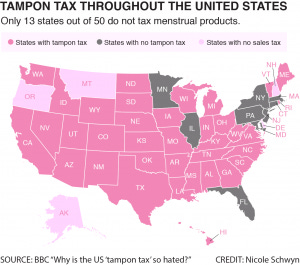Period Poverty:
Feminism can represent a lot of things. It could mean wanting the same pay as your male counterpart or feeling safe in the communities you are surrounded by. Human necessities need to be implemented so that minorities are off to a fair start.
I was impacted when I read an article where they surveyed girls worldwide to see how their access to sanitary products affected their day-to-day life. A UNESCO report shows that one in every ten girls in sub-Saharan Africa miss school on their menstrual cycle. First of all, why is this not being talked about? Why is a natural body function for half the world's population affecting people's ability to receive a quality education? In impoverished regions like Ghana and Kenya, 11.5 million women do not have adequate feminine hygiene products because they cannot afford to buy them from their local markets or are not provided. These simple issues allude to past years when women were utterly undermined and at a disadvantage in all aspects of society. Back then, the discrimination came solely from bias and straight-up confrontation like "you can't do this because you are a woman." However, nowadays, it stems from a less distinct system with multiple barriers that discriminate against women and hold them back.
There is something called the "pink tax" in the United States that taxes feminine hygiene products.
Hygiene products that all women need to have access to so that some men don't call them 'disgusting' or 'unhygienic.' These men are the same people who tax feminine products, so where does this circle end? This becomes a double-edged sword where women have to pay large amounts of money for a product they need to be frowned upon in society. Cigarettes are taxed for a good reason because they are proven to cause cancer, and society needs the extra tax for awareness of the dangers of smoking, health care, and trying to stop people from starting smoking. Are feminine hygiene products anything like cigarettes? Do they cause cancer? Do they impact the community? No! Every woman needs access to these products and at a reasonable price. People in power act as if these products are self-indulgent rather than a necessity. This needs to stop.
Some great ways to support this issue is by fundraising for menstrual products to give to impoverished settings. Two girls at my school are collecting products to give them to a women's homeless shelter. Another action you can take is to talk more about period poverty. There is a stigma around periods where some cultures even deem it as sinful or impure, and men don't know enough about periods to help support the issue. If we can talk about it and get each other educated, more people will be willing to take action.
You can donate to this great organization that supports impoverished regions that do not have menstrual products provided for their women.
Sources:
https://www.campaignlive.com/article/why-women-shouldnt-taxed-feminine-products/1458821
https://blogs.worldbank.org/education/globally-periods-are-causing-girls-be-absent-school
Next week: I will give more resources for this month's topic on women's rights so that you can take action upon the issues surrounding it.
Next month: highlighting advocacy concerning disabilities



This is unconscionable! Thanks for another great post!
Another example of misogyny- an unnecessary sp? expense - who more often than not are also the ones with the least economic strength.